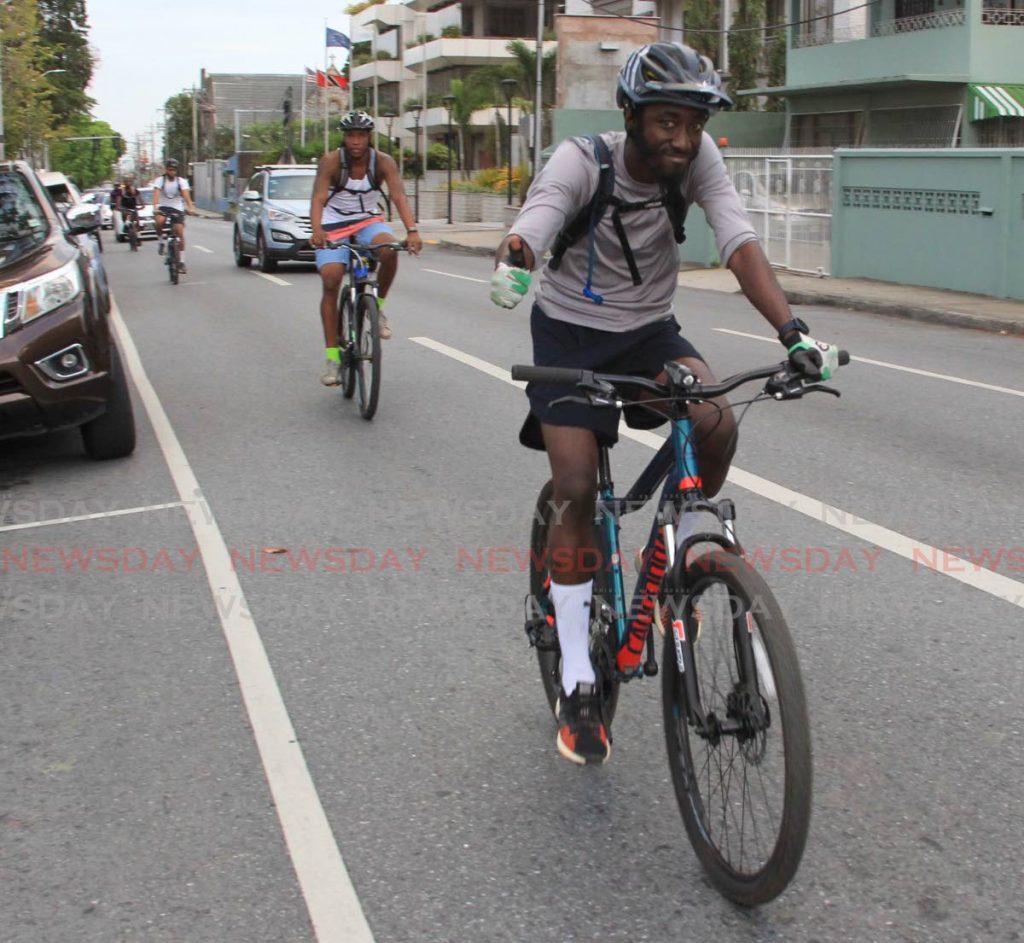Exercise slowly, avoid extreme diets

MANY PEOPLE have found themselves a few pounds heavier after being at home for eight to ten weeks, due to the lockdown measures implemented by Government to combat the global coronavirus pandemic.
They have been snacking more than usual, trying new recipes or making “comfort food”, drinking more alcohol, moving around less, and doing little to no exercise.
A few people have staved off the pounds or even lost weight by cooking healthy foods, doing cardio or yoga exercises at home diligently, or by reducing their intake of flour and sugar. Some say they lost weight slowly or retained their weight because they did not have access to fast foods, ate regularly, and drank more water than usual.
With the gradual release of covid19 restrictions, however, those who gained weight or put on inches may decide it was time to start losing weight to comfortably fit into their clothes for when they finally have to get back to work.
In this case, fitness and health professionals advised two things, start back exercising slowly, and avoid fad or extreme diets.
WORK IT OUT
Fitness coach and sports scientist Tobias Ottley said some of his clients complained of a six-to-eight pound weight gain during the covid19 stay-at-home period.
However, he said, even though there would be “some losses” it was more important for people to keep moving rather than doing an exercise programme in line with what they were doing previously.
He said people should be mindful of things like hydration, flexibility and mobility and start working on that. It could include just moving around the home more and doing stretches or doing beginners yoga or pilates online.
He warned people to be controlled and “not go buck wild” now that some covid19 restrictions were lifted and people could go outside to exercise.
“It’s easy to go and overdo when you may not have been doing anything before. There are people going to run and walk just because they want to be outside but they never ran and walk for exercise before. If you go from zero to 100, like with anything else, you’re exposing yourself to potential risk of damaging yourself.”
He suggested that people ease back in to exercising and be mindful of how they treat their body so as not to shock the system. He recommended that people do half of the routine they did previously for the first several days so their bodies could get accustomed to exercise again.
“Weight loss may be driving the desire to exercise but now is definitely not the time to think about that. You have to be gentle with yourself. There is a certain amount of self-care that’s required now. You have to be realistic. It’s going to take a little while to lose this weight in a healthy manner if you want to keep it off.”

He said many of his clients complained that there was only so much they could do at home, that they wanted the equipment at the gym, or they did not know which exercises to do at home.
He said people should find out what exercises they find most enjoyable and find variations of those. He added that, covid19 or not, people had to be willing to change where they are and be honest with themselves. He said they need to know what they liked, what made them happy, what worked for them and stick to it.
If they were not aware of those things, he said, they should experiment, ask around, and try exercises available online. He also suggested that they find trainers willing to do a sample session as some people had to have a trainer with which they “clicked.” But whatever they did, he said they should not give up and do nothing.
Ottley also recommended using the buddy system for motivation, inspiration, and accountability.
He said even at home it was possible through technology such as video calls and Zoom. He said there was no need for conversation if they did not want to talk but just having someone there would increase accountability and, of course, they could encourage each other.
However, he said people should try to not pair themselves with someone at a much higher fitness level and try to keep up with them.
“You’re going to end up in a lot of pain, you’re going to get frustrated because that person is accustomed to that form of exercise. And then when you get that soreness and you stop exercising because that soreness has kicked in, you might actually find yourself in an even worse position than where you started back.
“One important thing is not to compare yourself to anyone else and don’t compare to yourself six weeks ago because that’s an easy pathway to frustration.”
Another important step, he said, was to reform habits. Ottley said it was important for people to get back into their sleeping pattern to reset the body clock as naps during the day was no substitute for night sleep. He suggested walking up at the time you used to in order to go to work or the gym. He said to get off the bed and move around even if you go back to sleep after a while.
When it came to exercising with masks, he acknowledged they would “reduce respiratory capacity” but, he said people had to work within government-issued guidelines.
“It would be part of that concept of easing back in. View it as a training tool to improve strength of breath. When we go back to not needing masks, it would seem a breeze. No pun intended. The human body is a magnificent machine and you will learn to adapt. Just accept that there will be a week or two to adapt.”
Certified trainer, nutritionist, and president of the TT Bodybuilding Federation, Susanna Hadad-Jerome also said people should start slow.
She said if they had a few steps they could step up and down or walk up and down a flight of steps, walk around the house, do stretches, or use bags of peas or rice as weights. The point, she said, was for people to do something they were not doing at the moment.
She stressed that they should not do too much at one time but when something started to feel easy, people could increase the reps or change the type of exercise in order to improve slowly but surely. She said for those who were accustomed to exercising, muscle memory would kick in and eventually the body would return to its previous fitness level. But if a person was doing an exercise that was not working, they should try something different.
“I keep telling everybody you did not go to sleep skinny one night and wake up big the next morning. So you cannot expect to go to bed one night big and get up skinny the following morning. It doesn’t work like that.”
She added that fad diets put people’s health at risk so she recommended eating in moderation.

For those who did not have any medical conditions or diet restrictions for their health, she gave some advice. Try not to eat carbohydrates at night. If people were not active, they should cut down on the total amount of carbs and sugars they ate. Eat less but more frequently. Do not miss meals. Drink plenty of water, more than eight glasses a day. Alcohol is sugar so avoid drinking too much. One glass of wine a day is enough.
She also encouraged going outside because fresh air and sunlight was healthy. She said she did not agree with wearing a mask while exercising because people would be inhaling more carbon dioxide than oxygen which could cause them to feel light-headed and pass out. Instead, she said, people should keep their distance from others or exercise at home without masks.
A LOT IS IN YOUR MIND
One nutritionist and dietitian said it was important to realise people used food for things other than nutrition. She said exercise and eating was also psychological so some people ate when they got bored, stressed, anxious, or frustrated without even realising what they were doing.
She said in her line of work many people asked her for diet sheets but very few followed it unless they had serious health issues, and even then some found it difficult to stay on track.
“No self-respecting cashew nut lover is going to eat six cashews, which is the portion size. Who is going to eat one eighth of an avocado with their meal? Or only two faces of a julie mango when they are accustomed sitting down with a bucket of mango? I have had people leave my office with diet sheets in their hands and go across the road to buy coconut drops and mauby. A lot of it is in your mind. You have to decide if you want to sacrifice the pleasure of eating to lose a few pounds.”
She said if someone was really concerned, they should make a meal plan – what they were going to eat for breakfast, lunch, and dinner for a week. The next step would be to go grocery shopping for ingredients to make the meals.
She said people should not go shopping when they were hungry, and they should avoid or limit high-calorie foods such as sweets or high-fat foods. She said if these things were not in the house, people could not eat it.
She said to be careful about low-fat foods because those tend to be high in sugar. Therefore, she said people should make it a point to start reading labels and expiry dates, especially when things are on sale.
She also suggested trying to enjoy preparing meals and feeling a sense of achievement in doing a good job. She also said to watch the method used to cook. She noted that oil was difficult for the body to digest so instead of frying meat, season it well and grill, bake, boil, or steam it.
“I’m not saying you can’t enjoy some fried food every once in a while, but the other methods are so much more healthy. Make up your mind that if you eat more than you burn up, you’re going to put on weight because the body takes the excess food and deposits it as fat.”
She said a slow cooker was a “wonderful piece of equipment” as it helped the food “retain all the juices”. She suggested cooking dried peas and beans in the slow cooker in bulk and freezing it. A portion could be removed, seasoned and cooked when ready and it would be more economical, flavourful, and healthier than the tinned variety.
In addition, she said people needed to stop associating salads with a deprived diet regime. She said a salad could be filling and tasty and people did not have to use vegetables only.
“If you decide all you’re eating is lettuce and raw tomatoes and some cucumber because you’re dieting, that’s when you’re going to get hungry and just forget about the whole thing.”
She said fruit, legumes, chicken, potatoes, rice, and other starches and proteins could also be included, as well as a sprinkle of salt and few drops of vinegar or olive oil. The salad could also be put in a pita bread, similar to a gyro.
Registered dietitian Kellie Colthrust said it all came down to a balanced diet. She said people who ate only fruits and vegetables or who cut certain food groups out of their diet were at risk of some level of malnutrition.
She explained that a balanced diet meant eating from the six Caribbean food groups on a daily basis. The food groups are staples or starches, legumes and nuts, fruits, vegetables, fats and oils, and foods from animals which include meat, milk, and eggs.
“Some people turn to the fad diets because they give you quick results, but these results are not long-lasting because fad diets tend to be unsustainable and impractical, whether financially or to sustain your nutrient needs. They don’t really fit in to many people’s daily lives and that’s what you want to do. You want to get to a place where you can eat that balanced diet, that healthy diet that fits and works with the practical, modern day human being so they could be consistent.”
She said people gained weight when they had excess energy in their system. Therefore, people should choose foods that were high in nutrition but lower in energy. These include vegetables, peas and beans, and other items from the food groups.
They should also choose less fats and added sugars. She said people should drastically cut down on things like fast food, ice cream, cakes, and soft drinks. They should also avoid binge eating or eating because they are bored or have anxiety.
“Instead of going to the fridge all the time, try to be mindful of what you’re doing. Just stop and ask yourself, ‘Am I really hungry?’ If the answer is no, have a glass of water.”
She added that water should be people’s preferred drink as many beverages had a lot of added sugars but very little nutrition. For those who did not like plain water, she suggested trying fruit-infused water.
Colthrust also warned people not to get overzealous about eating out now that some restrictions on food establishments were lifted. She said if people still wanted food they did not cook, they should till try to choose foods with less fat and sugar.
Another suggestion was to eat on time. She said some people would get caught up in an activity, forget to eat and then have a huge meal to compensate. She suggested they be aware of their body’s needs, stop what they were doing and have a meal. If they were practising intermittent fasting, they should have a regular-sized meal, not trying to make up for the meals they missed throughout the day.
She said one easy way to lose weight was the “healthy plate.” Half of the plate should be vegetables, raw or cooked, one quarter of the plate should be filled with starchy foods like rice or provision, and the last quarter, peas, beans and meat.
In addition to eating healthy, she said people should exercise. She stressed that if someone had a pre-existing condition, they should see a doctor before engaging in any exercise. But if a person wanted to lose weight they should make exercise a part of their daily routine to burn energy.


Comments
"Exercise slowly, avoid extreme diets"